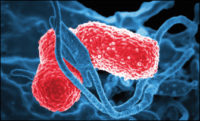Benefits of Potassium
People often eat bananas, avocados, and leafy greens for various health benefits. New research adds another benefit: These and other potassium rich foods may help prevent heart disease, ScienceDaily.com reports.
Researchers at the University of Alabama at Birmingham found that a high-potassium diet makes arteries more flexible, and thus could reduce the risk for atherosclerosis, or “hardening of the arteries.” For the study, the researchers fed mice with a genetic susceptibility to heart disease a diet with low, normal, high levels of potassium.
Despite advances in the prevention and treatment of hypertension over the past decade, hypertension remains an important public health challenge. Recent efforts to reduce the prevalence of hypertension have focused on nonpharmacologic means, specifically diet. An increased intake of minerals such as potassium, magnesium, and calcium by dietary means has been shown in some studies to reduce blood pressure in patients with hypertension.
The mice on the low-potassium diet had more severe narrowing and hardening of the arteries than those with adequate potassium intake. High potassium diets had the opposite effects, suggesting that potassium rich foods – which also include potatoes, spinach, carrots, and artichokes – could also help prevent heart disease in people.
In addition, normal body levels of potassium are important for muscle function, including relaxing the walls of the blood vessels. This lowers blood pressure and protects against muscle cramping. Normal potassium levels also are important for the conduction of electrical signals in the nervous system and in the heart. This protects against an irregular heartbeat.
 | Calcium Magnesium Plus Soft Gels - New Formula! (120 gel caps)A Macro-Mineral Supplement That Promotes Reduced Muscle Cramping, Healthy Bones & Lower Blood Pressure View in Store |
Benefits of Magnesium
Magnesium is an important mineral, playing a role in over 300 enzyme reactions in the human body. Its many functions include helping with muscle and nerve function, regulating blood pressure, and supporting the immune system.
Though it may not be as well known as other essential minerals like potassium and calcium, magnesium is absolutely crucial for healthy body functioning. Unfortunately, experts estimate that about 80% of adults are deficient in this vital mineral. Those who consume less than their recommended amount of magnesium are likely to have elevated inflammation in the body, which can put you at risk for cancer, diabetes, heart disease, and other health conditions. Deficiency is also associated with osteoporosis.
We need magnesium to help blood vessels relax, and for energy production, and bone development.
The National Institutes of Health (NIH) reports that most older adults in the U.S. don’t get the proper amount of magnesium in their diets.
Benefits of Calcium
Calcium is important for healthy blood pressure because it helps blood vessels tighten and relax when they need to. It’s also crucial for healthy bones and the release of hormones and enzymes we need for most body functions.
Our body needs calcium to build and maintain strong bones. Your heart, muscles and nerves also need calcium to function properly. Some studies suggest that calcium, along with vitamin D, may have benefits beyond bone health: perhaps protecting against cancer, diabetes and high blood pressure.
The Bottom Line
Mineral Depletion. Too little potassium, calcium or magnesium in your diet can contribute to leg cramps. Diuretics – medications often prescribed for high blood pressure – also can deplete these minerals.
Cal-Mag-Pot (calcium, magnesium, potassium with (Boron and vitamin D) is the very best combination macro-mineral supplement that exists. It works to promote healthy bones, strong teeth and helps prevent Osteoporosis. Studies indicate that proper macro-mineral supplementation can also assist in lowering blood pressure – plus reduce those annoying leg cramps!


